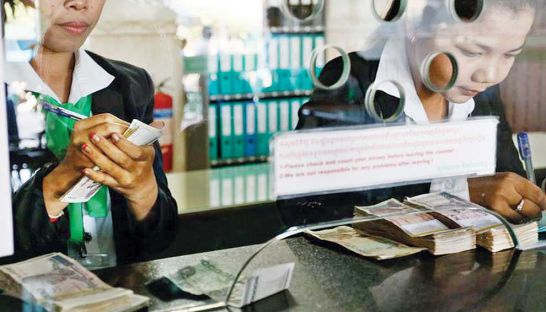Cambodia: Government reduces tax load on MFIs receiving money from abroad
The Ministry of Economy and Finance (MEF) recently decided to shrink the tax burden for local microfinance institutions (MFIs) by lowering withholding tax on interest from loans acquired from abroad from 14 to 10 percent, a move that the government claims will keep the massive sector sustainable.
This is the first inducement the government has offered the sector since the sudden imposition of an 18 percent cap on annual interest rates effective as of April 1, a drastic cut from the prevailing 20 to 30 percent rates offered primarily on small loans.
The interest rate cap was widely seen as a populist measure taken by the National Bank of Cambodia (NBC) ahead of the commune elections earlier this year, and one that had analysts fearful that it could cause a string of bankruptcies or see small lending dry up.
According to the MEF’s new prakas, signed by Finance Minister Aun Porn Moniroth on October 27 and obtained by The Post yesterday, the 14 percent withholding tax that MFIs pay on loans from abroad will be reduced to 10 percent while the remaining 4 percent will be considered as the government’s responsibility to handle.
The reduction was implemented from the signing date and will last until the end of 2018.
“This prakas is purposed to reduce the burden on expenditure on interest rates that microfinance institutions take on loans from abroad to ensure the sustainability of microfinance sector,” the MEF decree said. “This concession is activated on payment on interest rate within 2017 and 2018, but it is not subject to apply on any interest rate before this prakas come into effect.”
According to the MEF decree, in order to receive the tax reduction MFIs need to have supporting documents, such as loan agreements properly legally verified by both parties, documents on the actual transfer of capital and proper accounting records showing that the loan has been received.
MFIs have traditionally tapped into foreign loans from development agencies and international finance organisations to shore up capital, expand services and increase the ability to lend.
Yun Sovanna, general secretary of Cambodia Microfinance Association (CMA), said the government intervention will help MFIs to lower expenses by reducing the costs associated with obtaining funds, a main factor that has forced operators to issue high interest rates.
“This prakas is clearly intended to provide benefits to the people by reducing the cost of microfinance loans,” he said. “MFIs will have to ensure that these savings will be passed on to the client.”
He said the CMA was still seeking clarity from the MEF on how to implement the prakas, especially in regards to the specific terms and conditions of legally verifying overseas loans.
Total debt among the top seven MFIs amounts to $1.33 billion as of last year, according to Sovanna. Of this figure, $1.09 billion of this debt is owed to overseas lenders, equal to about 80 percent of total outstanding debt or 40 percent of gross loan portfolio.
Based on the figure of $1.09 billion of overseas debt, industry insiders predicted yesterday that MFIs could save about $4 million due to the government’s decision to lower the withholding tax on interest rates.
Sok Voeun, chief executive of LOLC (Cambodia), said that by decreasing the tax obligations on loans taken from abroad, cash flow will be freed up to meet the stringent 18 percent interest rate cap.
“We are happy with this decision because it reduces our burden on spending on the source of funds, which will also help us to activate the 18 percent interest rate cap,” he said.
However, he added that with 2017 almost over, the reality is that the reduction is technically only in effect for one year and should be extended.
Sean Thornnin, an economics lecturer at University of Cambodia in Phnom Penh, said that the government’s intervention appeared reasonable and showed the MEF was taking into consideration the difficulties that MFIs face in meeting the interest rate cap without slowing lending activities.
“This reflects that the government understands the burden MFI operators face,” he said. “And the timeline of ending the reduction at the end of 2018 gives the MEF enough room to amend fiscal policy, especially if a new government is formed after next year’s election.”
Source: http://www.phnompenhpost.com/business/government-reduces-tax-load-mfis-receiving-money-abroad


 Thailand
Thailand




